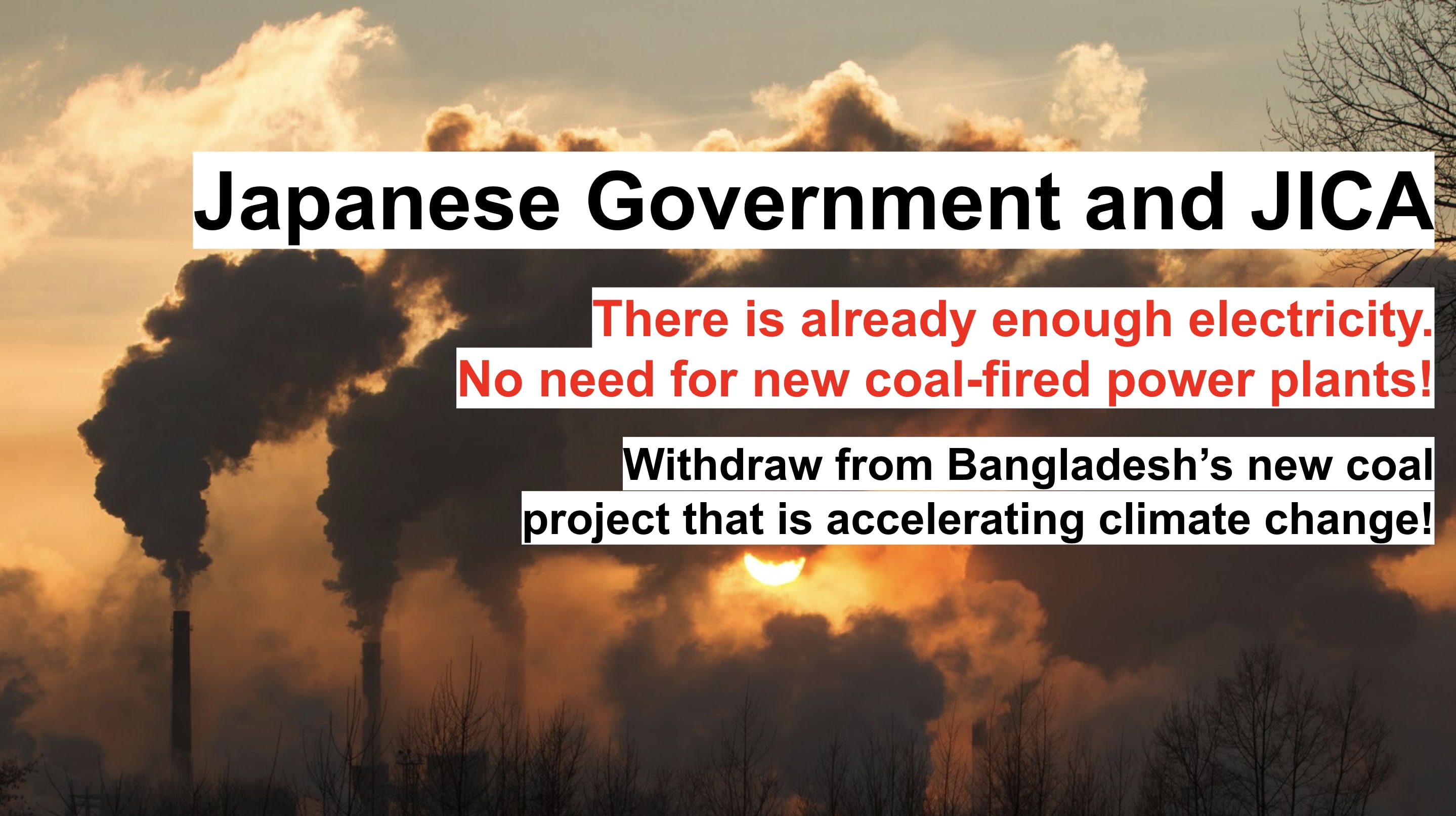Joint Statement: NGOs protest Japan Ministry of Foreign Affairs decision on preparatory survey for Phase 2 of Matarbari coal-fired power plant (Bangladesh) despite climate crisis and surplus power supply

Japan’s Ministry of Foreign Affairs (MoFA) has confirmed that it has decided to proceed with a preparatory survey by the Japan International Cooperation Agency (JICA) for the proposed Phase 2 of the Matarbari ultra-supercritical coal-fired power project in Bangladesh. The environmental NGOs declares their disappointment with this recent decision, and call upon the government to reverse the decision.
June 22, 2020
Joint Statement:
NGOs protest Japan Ministry of Foreign Affairs decision on preparatory survey for Phase 2 of Matarbari coal-fired power plant (Bangladesh) despite climate crisis and surplus power supply
Japan Center for a Sustainable Environment and Society (JACSES)
Kiko Network
Friends of the Earth Japan
Mekong Watch
350.org Japan
Japan’s Ministry of Foreign Affairs (MoFA) has confirmed that it has decided to proceed with a preparatory survey by the Japan International Cooperation Agency (JICA) for the proposed Phase 2 of the Matarbari ultra-supercritical coal-fired power project in Bangladesh*1. As environmental NGOs we have been calling upon the government to end its use of official development assistance for coal-related projects. We hereby declare our disappointment with this recent decision, and call upon the government to reverse the decision, for the reasons stated below.
- Japan’s Long-term Strategy under the Paris Agreement (approved by the Cabinet in June 2019) states that “the Government will promote the development and investment of energy infrastructure abroad in order to contribute to the global reduction of CO2 emissions consistent with the long-term goals stipulated in the Paris Agreement.” Matarbari Phase 2 is a project to build a new coal-fired power plant, but MoFA has failed to provide any rationale to justify that building Phase 2 is in line with the long-term goals of the Paris Agreement.
- Japan’s Strategic Energy Plan (approved by Cabinet in July 2018) states that the government will provide assistance to coal-fired power projects “only for those countries that are forced to choose coal as an energy source from the perspectives of energy security and economic viability.” However, construction costs in Bangladesh for photovoltaic solar power are already cheaper than for coal, and MoFA has provided no evidence that building Phase 2 is the right choice economically.
- According to a report entitled “Revisiting Power System Master Plan (PSMP) 2016” (published in November 2018) by the Ministry of Power, Energy and Mineral Resources, Bangladesh*2, the maximum electricity reserve margin in Bangladesh is anticipated to be 69% and the actual reserve margin is expected to consistently exceed targets until 2041. One could therefore conclude that the real need to build a new large-scale coal-fired power plant will be low for the foreseeable future. MoFA has provided no evidence to show the need for or validity of Phase 2.
- JICA’s Guidelines for Environmental and Social Considerations state: “Prior compensation, at full replacement cost, must be provided as much as possible. Host countries must make efforts to enable people affected by projects and to improve their standard of living, income opportunities, and production levels, or at least to restore these to pre-project levels.” However, these requirements are not being met for Matarbari Phase 1 (currently being funded by JICA), due to delays in paying compensation and providing alternative houses. The project is also causing many problems, with significant adverse impacts on the livelihoods of local communities, including increased severity of flooding due to damage to irrigation water channels and water gates, damage of community roads, an increase in traffic accidents, and sedimentation of rivers. Local communities have made repeated requests for the project owners and JICA to resolve these problems, but the responses have been exceedingly slow. Since Phase 2 will use the same land that was expropriated for Phase 1, MoFA should verify whether or not the Matarbari project complies with the conditions of JICA’s Guidelines for Environmental and Social Considerations. However, MoFA has provided no evidence to show that the Guidelines are being met.
At the 50th meeting of the Development Project Accountability Committee (under the auspices of MoFA), MoFA stated that issues such as the need for and validity of Matarbari Phase 2 will be confirmed through JICA’s preparatory survey*3. However, a certain amount of evidence should be provided before examining the feasibility of any individual project, and the limited ODA funds should only be spent for preparatory surveys for projects that have a relatively high level of validity and feasibility. Therefore, we believe that JICA should not proceed with the preparatory survey for Phase 2 of the Matarbari ultra super critical coal-fired power project.
Finally, this decision about Matarbari Phase 2 was made while discussions are still underway among the relevant ministries and agencies to review four conditions for government assistance for coal-fired power-related exports. We therefore strongly object to this decision, as it has the effect of eviscerating the very meaning of those discussions.
Contact:
Yuki Tanabe, Japan Center for a Sustainable Environment and Society (JACSES)
Email: tanabe@jacses.org
*1: Confirmed with MoFA on June 19, 2020.
*2: Revisiting Power System Master Plan (PSMP) 2016
*3: 50th meeting of the Development Project Accountability Committee




